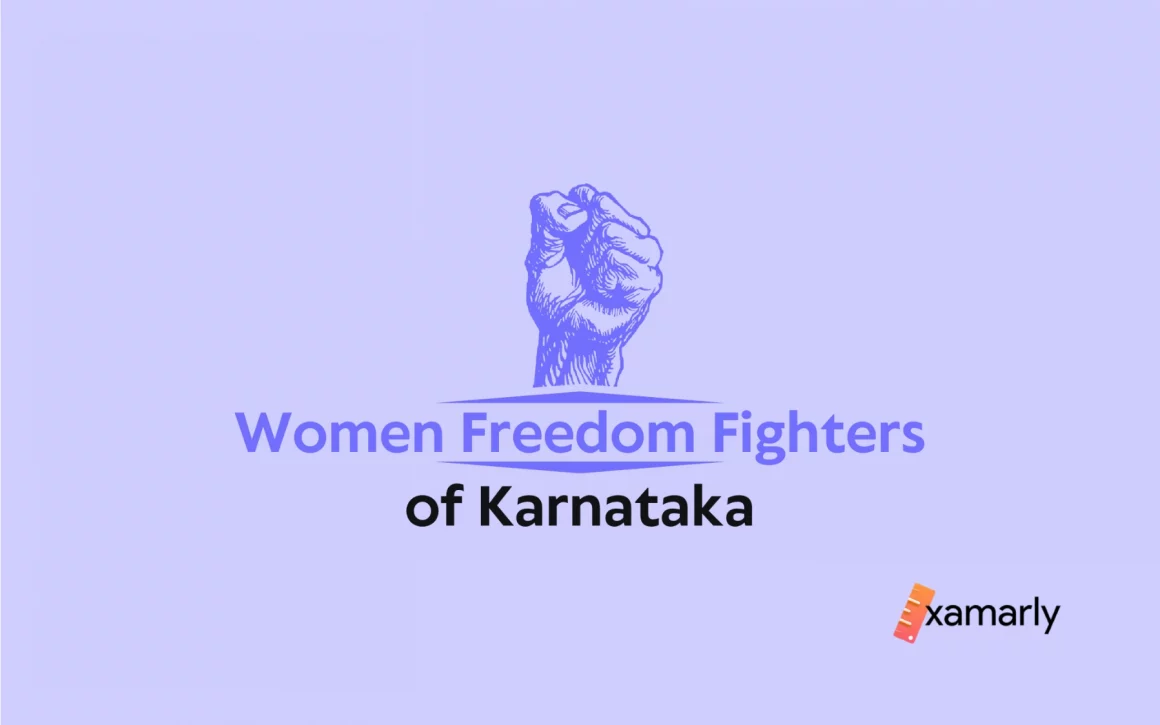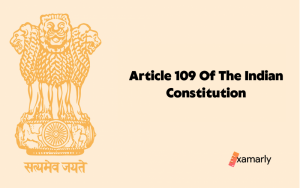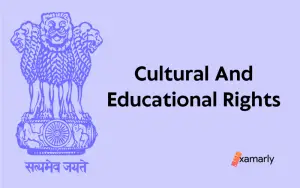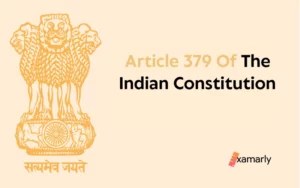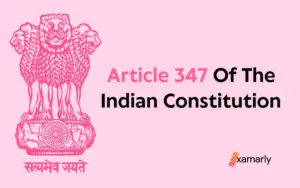Mahatma Gandhi led India’s struggle for freedom from 1920 to 1947. People from various backgrounds were drawn to his leadership. One big contribution in this struggle was of the women freedom fighters of Karnataka.
The proclamation by Gandhiji was prescient, when he expressed:
“When the history of India’s fight for independence comes to be written, the sacrifice made by the women of India will occupy the foremost place”.
The backbone of India’s liberation was the commitment of women. They gave up their time to volunteer, advocate, protest, fast, and donate to the objective of freedom. These women should be acknowledged to understand how they played an active role in the freedom of India.
Here’s to the brave women freedom fighters of Karnataka who took up arms to fight for the nation’s freedom.
- 13 Women Freedom Fighters of Karnataka
- 1. Kittur Rani Chennamma
- 2. Umabai Kundapur
- 3. Yashodhara Dasappa
- 4. Nagamma Patil
- 5. Kamaladevi Chattopadhyay
- 6. Rani Abbakka Chowta
- 7. Bellari Siddamma
- 8. Keladi Chennamma
- 9. Belawadi Mallamma
- 10. Padmavati Bidari
- 11. Shakuntala Kurtakoti
- 12. T. Sunandamma
- 13. Sarojini Mahishi
- Summary
- FAQs on Women Freedom Fighters of Karnataka
- Who is the first female freedom fighter from Karnataka?
- What was the role of Kittur Rani Chennamma in the freedom struggle of India?
- What was the contribution of Abbakka Rani in the fight against the Portuguese in Karnataka?
- What was Kamaladevi Chattopadhyay's contribution to the freedom struggle of India?
- What was the contribution of Sarojini Mahishi in the empowerment of women in Karnataka?
13 Women Freedom Fighters of Karnataka
Karnataka’s female satyagrahis sacrificed everything for the cause of freedom. Women played a very important part in the liberation struggle. Women played a very active role and made great sacrifices for the cause of their homeland both before and during the time of Gandhi.
Around the year 1920, the independence movement in Karnataka entered the Gandhian era. Read along to know about the 13 powerful women freedom fighters of Karnataka.
1. Kittur Rani Chennamma
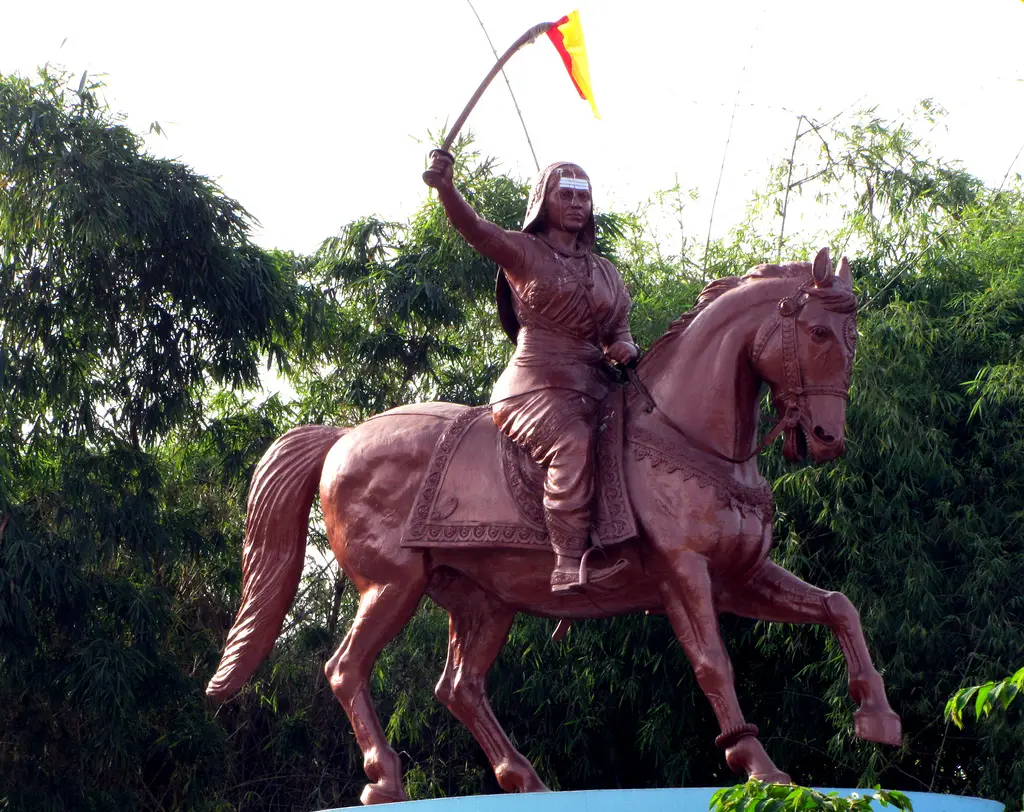
Rani Chennamma was a legendary queen and a freedom fighter from the princely state of Kittur in present-day Karnataka, India. She was born on October 23, 1778, and lived during the time of Colonial India. Chennamma became the queen of Kittur at the age of 15, following the death of her husband Mallasarja Desai.
She is remembered for her bravery and leadership during the Indian Rebellion of 1857, also known as the First War of Indian Independence. In 1824, when the British East India Company attempted to annex the princely state of Kittur, she led an armed rebellion against them.
She formed an army of 2000 soldiers, which included women warriors, and fought against the British forces. Despite being heavily outnumbered and outgunned, her army managed to repel the first British attack.
The British, however, were determined to capture Kittur and launched a second attack on the kingdom. In 1829, after a long and grueling battle, she was captured and taken prisoner along with her adopted son Shivalingappa. She was imprisoned in the Bailhongal Fort, where she died on February 21, 1829.
She is regarded as one of the earliest female freedom fighters in India and a symbol of resistance against British imperialism. Her bravery and leadership inspired many other freedom fighters, and she continues to be an icon of courage and patriotism in India.
To honor her contributions to the Indian freedom struggle, the Government of India issued a stamp in her name in 2007. Today, she is remembered as a legendary queen, a freedom fighter, and a symbol of women’s empowerment in India.
You might also like to read our article on Women Freedom Fighters of India.
2. Umabai Kundapur
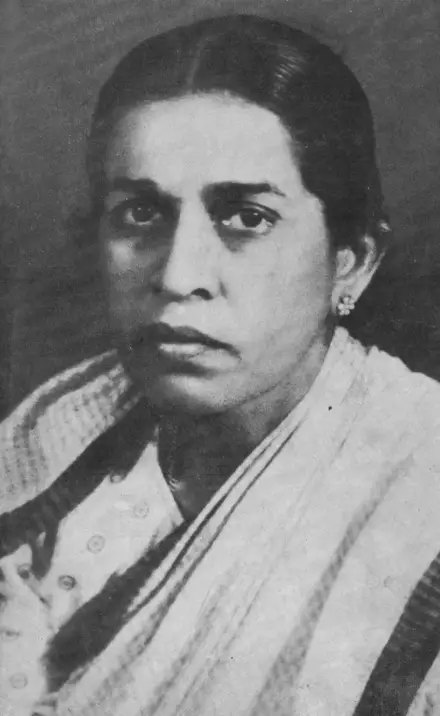
Umabai Kundapur, also known as Umabai Dabade, was from Kundapur, a small town in present-day Udupi district of Karnataka. She was born in 1923 in a rural farmer family, where she witnessed the sufferings of the common people under the British colonialists.
She was deeply influenced by the Indian independence movement and the ideas of Mahatma Gandhi. She joined the Indian National Congress and actively participated in the Quit India Movement of 1942.
She organized meetings, processions, and rallies, and encouraged more people to join. She also raised awareness about the importance of self-reliance and self-sufficiency. She promoted the use of Khadi clothes and Swadeshi products.
In 1944, Umabai Kundapur was arrested by the British authorities and imprisoned in the Bellary jail. She was subjected to inhuman treatment and torture, but she refused to be intimidated or broken. She continued to inspire her fellow inmates and became a symbol of resistance against British imperialism.
After India gained independence in 1947, Umabai Kundapur dedicated her life to social and political causes. She promoted the welfare of women, children, and marginalized communities. She was elected as the first woman member of the Kundapur Panchayat in 1954 and later served as a member of the Karnataka Legislative Council.
Umabai Kundapur passed away in 1997, leaving behind a legacy of courage, patriotism, and social justice. She is remembered as a symbol of women’s empowerment and a pioneer of the Indian freedom struggle. Several institutions in Karnataka have been named after her.
Related Article: South Indian Women Freedom Fighters.
3. Yashodhara Dasappa
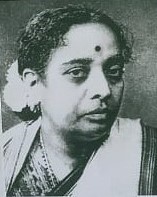
Yashodhara Dasappa was a prominent freedom fighter and social reformer from Karnataka, India. She was born on October 27, 1905, in a wealthy family in Dharwad, in a privileged background. She was deeply influenced by the Indian freedom movement and the ideas of Mahatma Gandhi.
She participated in various protests, processions, and rallies. She also worked to promote women’s rights and was a vocal advocate of women’s education and empowerment. She laid the foundation of the Karnataka Mahila Seva Samaja in 1947, which focused on improving the lives of women and children in the state.
After India gained independence in 1947, she continued to work for social and political causes. She served as the first woman Minister in the Karnataka government, holding the portfolio of Social Welfare and Labor. She led the establishment of the Karnataka State Women’s Development Corporation. It aimed at promoting socio-economic empowerment of women.
She believed in the power of education and worked to promote access to education for all, particularly women and marginalized communities. She also laid the establishment of the Karnataka Lingayat Education Society.
She passed away on October 2, 1976, but her legacy continues to inspire generations of people in Karnataka and beyond.
Also read our article on Unknown Female Freedom Fighters of India.
4. Nagamma Patil
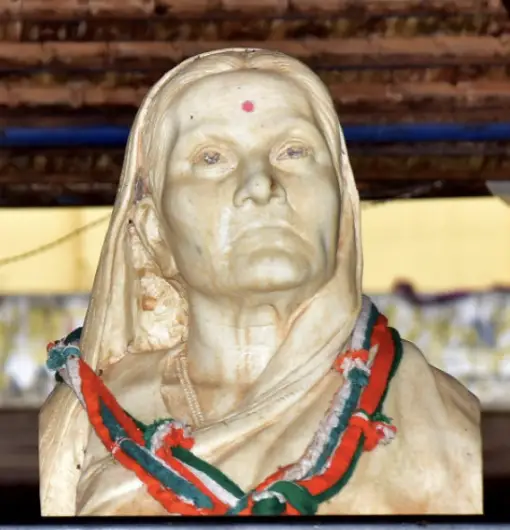
Amidst India’s independence struggle, Patil became a symbol of the Gandhian movement in Karnataka. After India achieved its freedom, she devoted herself to educating children. Born on December 16, 1905, she was married to veteran freedom fighter Padma Shri Sardar Veeranagouda Patil.
In 1924, when Mahatma Gandhi visited Belgaum, it made a deep impression her & she became an ardent follower of Gandhi. During the 1930s, she joined Sardar Veeranagouda and established Hubli’s Harijan Balika Ashram.
Both Nagamma and her husband joined the freedom fight in 1938 after hearing Mahatma Gandhi’s call to arms for the cause. She was detained and held in Hindalaga Prison in Belgaum for three months that same year. In 1942, she was likewise detained and held in the Yerawada Central for 13 months.
Read also: Famous Slogans of Female Freedom Fighters.
5. Kamaladevi Chattopadhyay
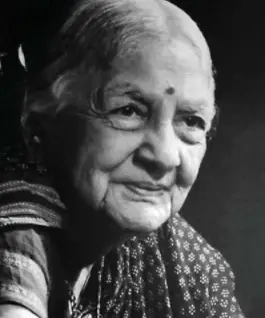
Born in Mangalore in 1903, Kamaladevi Chattopadhyay was a free-thinking feminist & freedom fighter. Her mother, a liberal Saraswat Brahmin, was her main inspiration.
Her parents made friends with a number of notable thinkers and independence fighters, including Mahadev Govind Ranade and Gopal Krishna Gokhale, as well as women’s rights activists Ramabai Ranade and Annie Besant. Due to this, young Kamaladevi became a swadeshi nationalist movement devotee at a young age.
She was in London when she learn about Mahatma Gandhi’s call for the Non-Cooperation movement. She returned to India and joined the Seva Dal. She was made in charge of the women’s section of the Seva Dal. She was a founding member of the All India Women’s Conference(AIWC). She was the first organizing secretary of the AIWC.
Kamaladevi Chattopadhyaya was also a part of the Salt Satyagraha. She remained committed to feminism throughout her life, and she never shied away from opposing men who infringed on women’s rights. Her work was so successful that she was the first woman in India to run for a legislative position.
She received the Padma Bhushan and Padma Vibhushan from the Indian government.
Read about the First Women Freedom Fighter of India.
6. Rani Abbakka Chowta
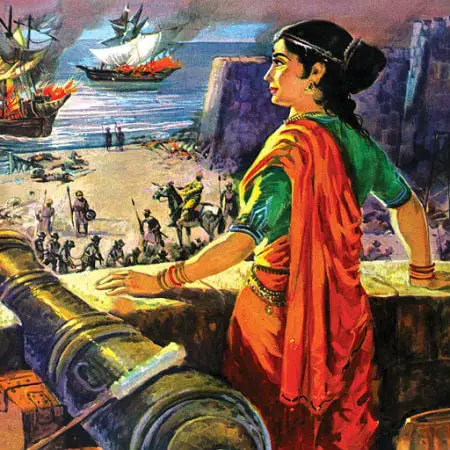
In the later half of the 16th century, Abbakka Rani was the first Tuluva queen of Ullal to engage in battle against the Portuguese. She was one of the first women to resist against colonialism and foreign invaders.
Her deeds helped the Indian freedom struggle get off the ground. Rani Abbakka earned the name Abhaya Rani (fearless queen) for her bravery.
Considering Ullal’s vital location, the Portuguese attempted many attempts to take it. For over four decades, Abbakka successfully repelled each of their assaults. Rani Abbakka gained the respect of her people, accomplished her dream of a free kingdom, and is still adored in her hometown of Ullal today.
You might also like to read about: Female Freedom Fighters of Tamil Nadu.
7. Bellari Siddamma
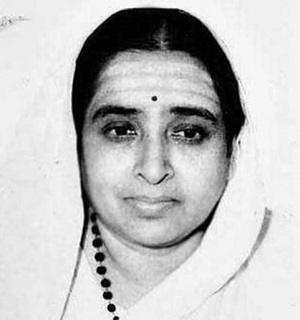
Bellari Siddamma was born in 1903 to a traditional family in the Dundasi Village of the present-day Haveri District. Her father was actively engaged in the struggle for liberation. He used to bring magazines and newspapers for Siddamma. Her nationalist beliefs grew as a result of this.
She found it simple to engage in the independence struggle because she was married to Murugappa, another freedom warrior. She had participated in the Shivapura Congress party in 1938.
She participated in the Aranya Sathyagraha in Chitradurga state in 1939, the “Mysuru Chalo” or “Aranmane Sathyagraha” & the Quit India Movement. In opposition to forest laws, the Aranya Satyagraha or Forest Satyagraha was organized. People engaged in civil disobedience by grazing cattle in the woodlands and cutting down valuable trees.
She is the first woman in the state of Mysuru to hoist the national flag & she served a one-month sentence in jail. She was arrested and sentenced to jail time due to the fact that she cut down wild date trees in the Davangere forests of Mayakowda and Anagond.
Later, she was elected as Davangere’s MLA & suggested the women start weaving and spinning. To ensure better health among rural women, she created “Mathrumandir.”
Her association with other important freedom fighters, including Sardar Veeranagouda Patil, S. Nijalingappa, and T. Siddalingaiah, made her a powerful leader and a key figure in the state’s history. She was honored with a copper plaque by the state government. She contributed to the fight for freedom and uplifting women in general.
Read also: Female Freedom Fighters of Maharashtra.
8. Keladi Chennamma
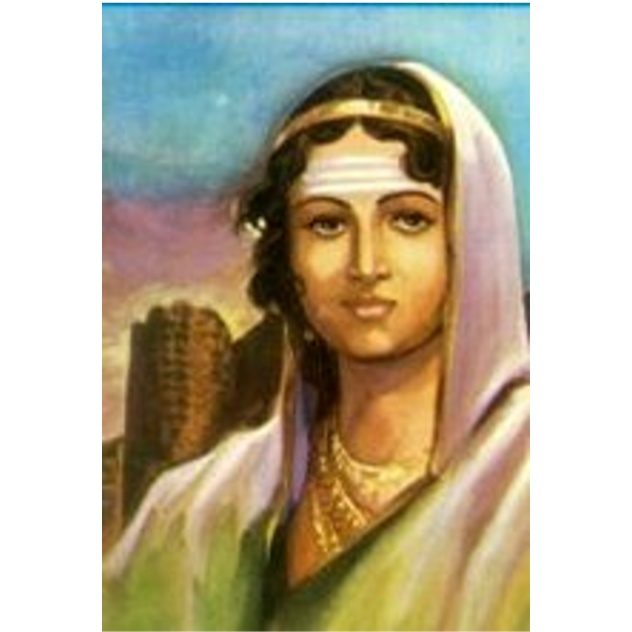
Keladi Chennamma was a prominent queen and warrior of the Keladi Nayaka Kingdom in Karnataka, India. She was born in 1671 in the Keladi Kingdom, in present-day Shimoga district, and was married to Somashekara Nayaka, the King of Keladi.
Her husband, Somashekara Nayaka, died in 1704, leaving their young son, Shivappa Nayaka, as the heir to the throne. During her son’s minority, she served as the regent of the Keladi Kingdom and played a key role in the administration of the state.
In 1734, the Maratha Empire, led by the Peshwa Baji Rao, launched an invasion of the Keladi Kingdom, seeking to annex it to their empire. Chennamma, then in her 60s, led the defense against the Maratha army, and successfully repelled their invasion.
Her bravery and military skills were instrumental in the Keladi Kingdom’s defense. The Keladi Kingdom continued to prosper under her rule, and she played a crucial role in promoting the welfare of the people.
She passed away in 1750, but her legacy continues to inspire generations of people in Karnataka and beyond.
Also read our article on Female Freedom Fighters of Goa.
9. Belawadi Mallamma
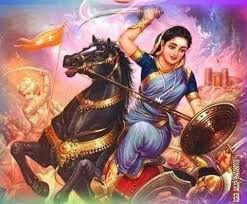
Belawadi Mallamma was a brave freedom fighter and a social reformer who lived in the state of Karnataka, India. She was born in 1878 in a small village called Belawadi in the Hubli district of Karnataka. She came from a humble background and worked as a laborer in a cotton mill in Dharwad before becoming involved in the freedom struggle.
She played a crucial role in inspiring and mobilizing masses against British. She was a vocal critic of the social and economic injustices perpetuated by the British.
She was known for her acts of bravery and courage. In one famous incident, she led a group of women to storm a British army post in Dharwad. They successfully retrieved a cache of weapons that had been confiscated from the Indian freedom fighters.
Belawadi Mallamma also worked to promote social reforms and women’s rights. She advocated for the abolition of child marriage and dowry, and promoted the education and empowerment of women. She was an ardent supporter of Mahatma Gandhi’s philosophy of non-violent resistance.
She passed away in 1941, but she is remembered as a pioneering figure in the Indian freedom movement.
You might also like to read: Female Freedom Fighters of Bengal.
10. Padmavati Bidari
Padmavati Bidari was a courageous freedom fighter and social reformer from Karnataka, India. She was born in 1915 in a small village called Hulikunte in the Belagavi district of Karnataka. She grew up in a family that was actively involved in the Indian freedom movement, and this influenced her to join the struggle at a young age.
She was known for her fierce determination and commitment to the cause of Indian independence. Her contributions to the Indian freedom movement were significant, and she was often subjected to harassment and arrest by the British colonial authorities.
She also worked to promote social reforms and women’s rights. She was a vocal critic of the social injustices perpetuated against women, particularly child marriage and dowry. She actively campaigned for the education and empowerment of women, and worked to promote gender equality.
After India gained independence in 1947, she continued to work for social and political causes. She actively promoted women’s education and empowerment, and was a vocal advocate of women’s rights. She served as a member of the Karnataka Legislative Council and worked to promote social and economic development in the state.
She passed away in 2002, but she is remembered as a pioneering figure in the Indian freedom movement.
Read also:
11. Shakuntala Kurtakoti
Shakuntala Kurtakoti was a brave freedom fighter and a social reformer. She was born in 1921 in the town of Dharwad in Karnataka, India. From a young age, Shakuntala was inspired by the Indian freedom struggle, and she joined the movement as a teenager.
She was a staunch advocate of women’s rights and was instrumental in organizing and mobilizing women against the British. Shakuntala was arrested and jailed several times by the British authorities. She was known for her courage and determination, and her commitment to the cause of Indian independence.
She organized and led several marches and protests against social injustices against women. She also raised awareness about the importance of education for women and worked to improve access to education for girls and women.
After India’s independence in 1947, she continued to work for social and political causes. She played a key role in the establishment of several women’s organizations and institutions in Karnataka.
She also served as a member of the Karnataka Legislative Council and worked to promote social and economic development in the state. She passed away in 2004, but her legacy continues to inspire generations of people in Karnataka and beyond.
Also read our article on Female Freedom Fighters of Telangana.
12. T. Sunandamma
T. Sunandamma was a prominent freedom fighter and social activist from Karnataka, India. She was born in 1915 in the village of Haralayya in the Kolar district of Karnataka. She was deeply inspired by the Indian freedom struggle, and from a young age, she actively participated in the movement.
She joined the Indian National Congress and worked to mobilize and organize women to participate in the freedom struggle.
In addition, She was also a social activist and worked tirelessly to promote social reform and women’s rights. She was a vocal critic of the social injustices that women faced, particularly child marriage and dowry. She also campaigned for the education and empowerment of women and worked to promote gender equality.
She was often subjected to harassment and arrest by the British authorities. Despite the hardships, she remained committed to the cause and continued to work for the betterment of her fellow citizens.
After India gained independence in 1947, Sunandamma continued to work for social and political causes. She actively promoted women’s education and empowerment and was a vocal advocate of women’s rights. She served as a member of the Karnataka Legislative Council and worked to promote social and economic development in the state.
T. Sunandamma passed away in 1987, but her legacy continues to inspire generations of people in Karnataka and beyond.
You might also like to read: Women Freedom Fighters of Kerala.
13. Sarojini Mahishi
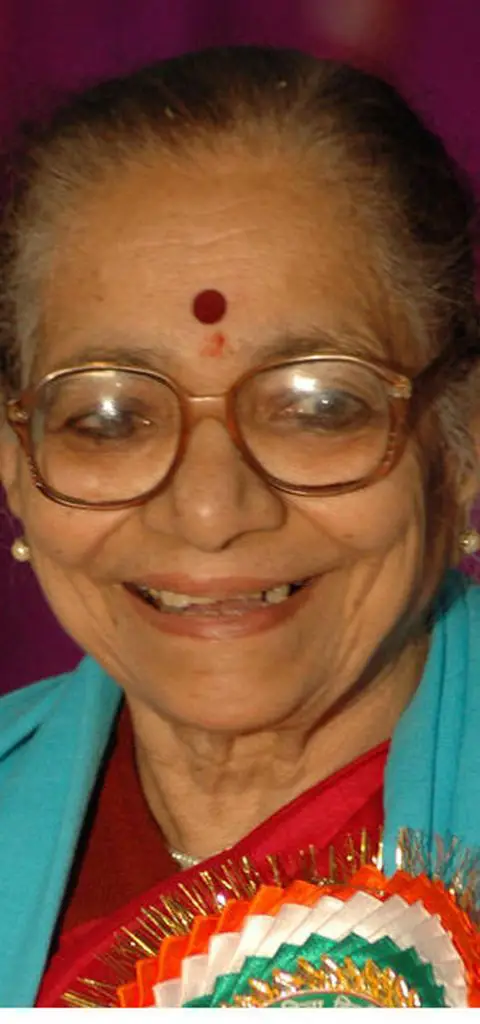
Sarojini Mahishi was a prominent social activist and freedom fighter from Karnataka, India. She was born in 1927 in Mysore, and from a young age, she was actively involved in social and political activities. She was deeply committed to social justice, and focused on empowering the Scheduled Castes and Scheduled Tribes.
She was a strong advocate for women’s rights and worked tirelessly to promote gender equality. She played a leading role in the formation of the Karnataka State Women’s Commission and worked to strengthen the rights of women in the state. She was also a champion of the rights of the working class and was actively involved in the trade union movement.
One of Sarojini’s most significant contributions was in the area of land reforms. She was appointed as the chairperson of the Karnataka Land Reforms Commission in 1974. Under her leadership, the commission proposed radical reforms to improve land ownership patterns.
These aimed to redistribute land to landless farmers and promote the welfare of agricultural laborers. The recommendations were eventually accepted by the state government.
Her contributions to the social and political life of Karnataka is respected for her activism and advocacy. Sarojini passed away in 2011, but her contributions to the betterment of society continue to be celebrated.
Read also:
Summary
Many women from Karnataka took up leadership roles in the Indian freedom struggle. Many have portraits and biographies on Kamat’s Potpourri website. At the time of independence, Karnataka was not a state but comprised of over twenty kingdoms and administrative blocks. As such, it is remarkable to note that women made up a significant part of the freedom struggle in Karnataka.
You might also like to read our articles on:
FAQs on Women Freedom Fighters of Karnataka
Who is the first female freedom fighter from Karnataka?
Kittur Rani Chennamma is revered as the first female freedom fighter of Karnataka. She led an armed revolt against British Colonial rule.
What was the role of Kittur Rani Chennamma in the freedom struggle of India?
Rani Chennamma was a queen of the princely state of Kittur in Karnataka. She fought against the British East India Company during the Indian Rebellion of 1857. She led an armed rebellion against the British and became a symbol of resistance against British imperialism in India.
What was the contribution of Abbakka Rani in the fight against the Portuguese in Karnataka?
Abbakka Rani was a queen of the Ullal region in Karnataka who fought against the Portuguese colonialists in the 16th century. She was known for her bravery and strategic skills and successfully led several attacks against the Portuguese.
What was Kamaladevi Chattopadhyay’s contribution to the freedom struggle of India?
Kamaladevi Chattopadhyay was a social reformer and freedom fighter. She was one of the first women to join the Indian National Congress. She also joined several important moves, such as the Quit India movement and the Salt Satyagraha. She was also a champion of women’s rights and worked to promote handicrafts and traditional arts.
What was the contribution of Sarojini Mahishi in the empowerment of women in Karnataka?
Sarojini Mahishi was a social activist and politician. She worked to promote the rights of women and marginalized communities in Karnataka. She was instrumental in the implementation of the Mahishi Report. This report recommended reservations for women in government jobs in the state. She also worked to promote education and employment opportunities for women and Dalits.


